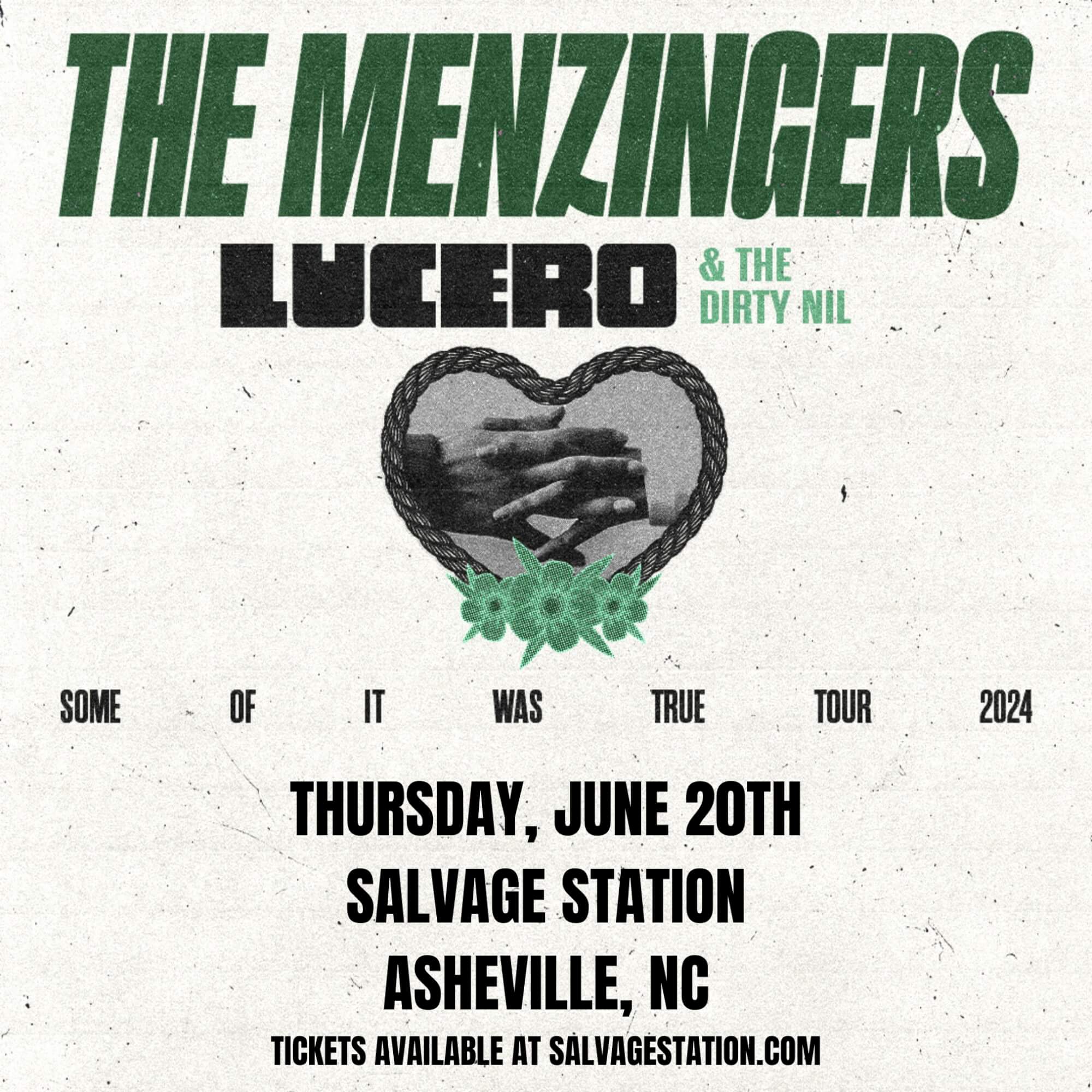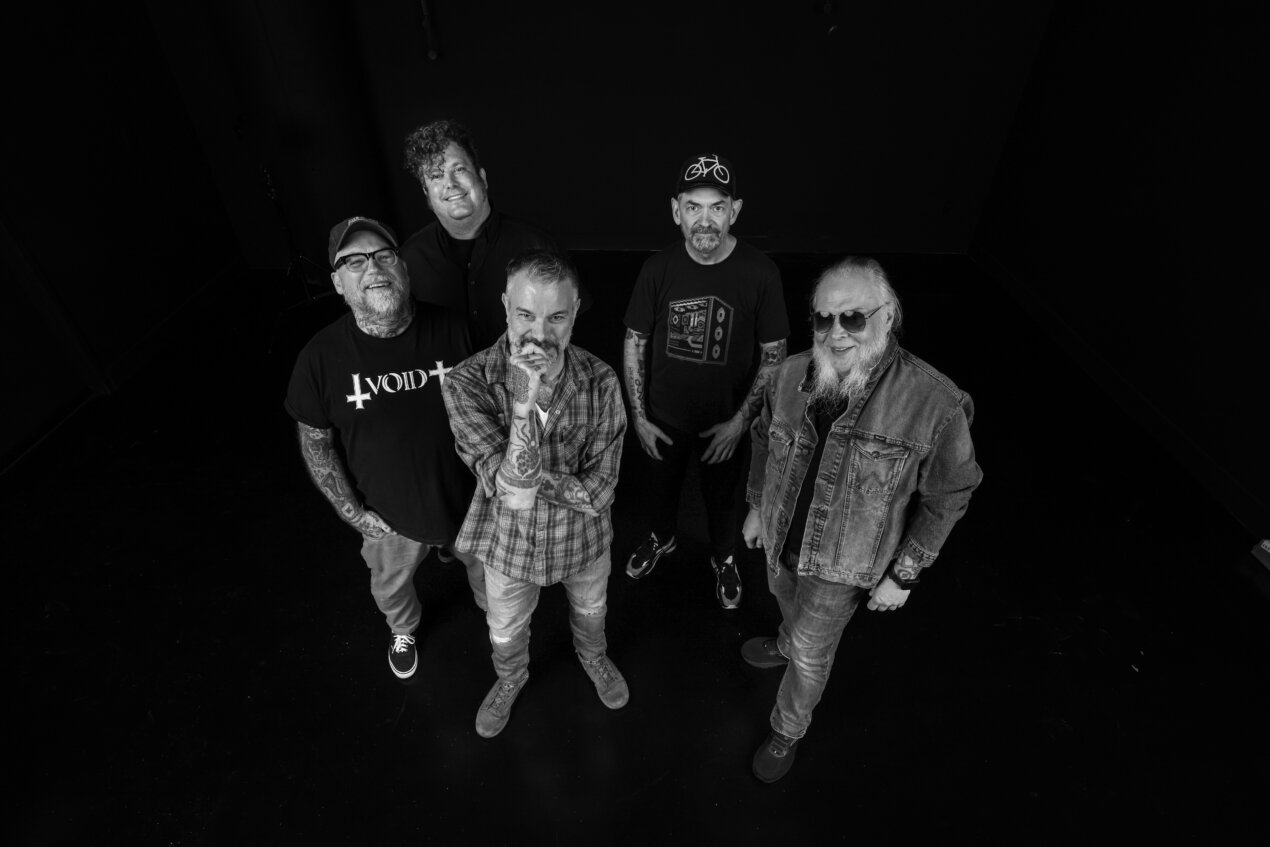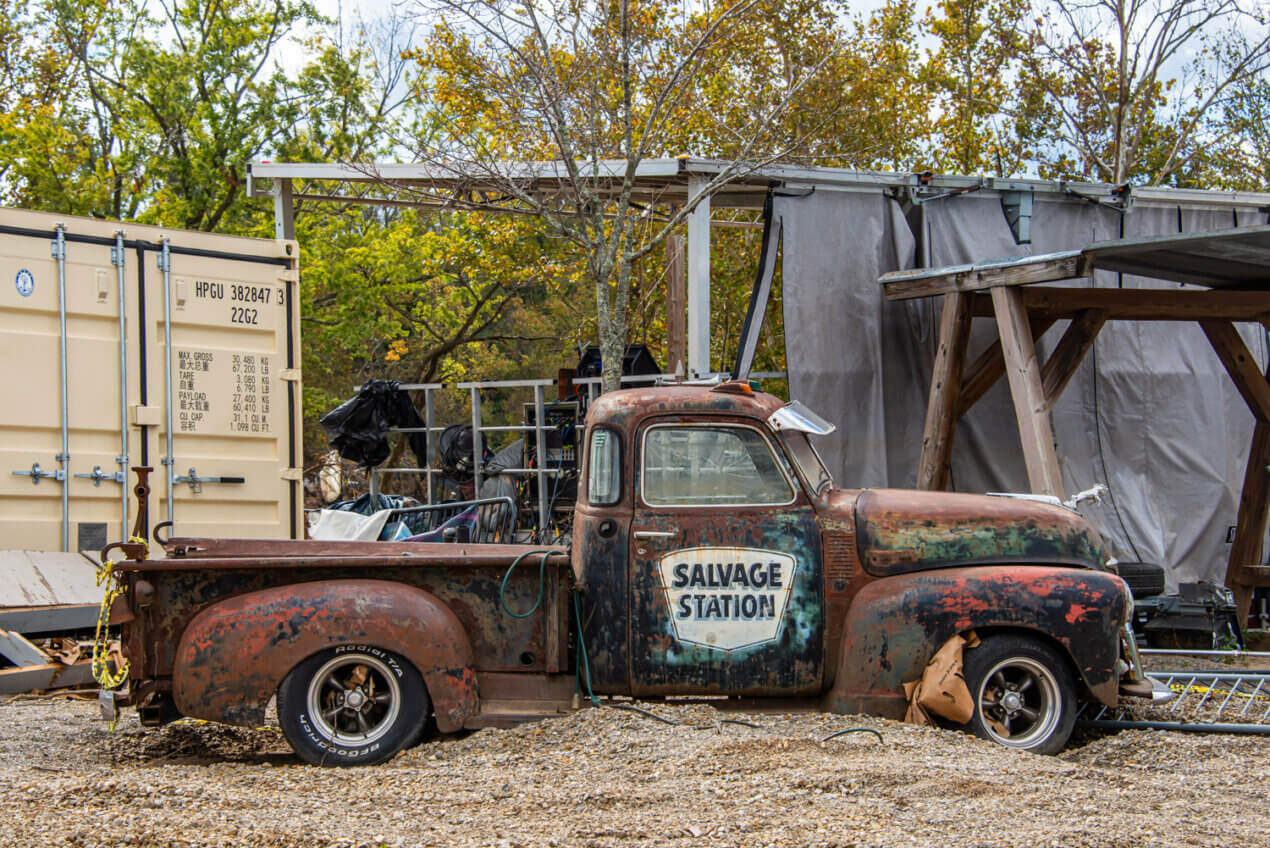
The Menzingers
with Lucero & The Dirty Nil
DOORS: 7:00 PM
STARTS: 7:30 PM
Live on the Indoor Stage
Genre: RockAge Limit: Must be 18 or Older
Free Parking; No Refunds
The Menzingers will be performing LIVE on the Indoor Stage at Salvage Station on Thursday, June 20th, 2024 with Lucero & The Dirty Nil! Doors open @ 7 PM and the music starts @ 7:30 PM. This is a General Admission show with FREE ON-SITE PARKING!
THIS SHOW IS SOLD OUT!
Root Down will be serving their delicious twist on Southern Soul Food PLUS we will have our FULL bar open for you to enjoy!
Scroll to the bottom for day of event information and policies.
Listen to The Menzingers:
About The Menzingers:

At this point, the Menzingers are an absolute institution. The Philadelphia punk legends’ multi-decade reputation as road warriors with an unbeatable catalog is cemented as hard truth—and their seventh album, Some Of It Was True, stands as their most immediate-sounding and energetic record to date. The follow-up to 2019’s sensational Hello Exile accomplishes the daunting task of capturing the Menzingers’ distinctive live energy in the confines of the studio, resulting in a sound that’s both rich, raw, and complementary to the group’s increasingly prismatic songwriting approach. More than 15 years in, the Menzingers are still holding their listeners square in the immediate present, and Some Of It Was True documents that power in thrilling fashion.
Some Of It Was True comes after the longest gap between Menzingers records to date—a gestational period brought on by the Hello Exile-era tour schedule’s delays due to the COVID-19 tour industry shutdown. “We weren’t really writing new music yet,” Greg Barnett explains. “We were talking about it, but we were honestly just happy to be out and touring again.” The acoustic reworks of 2020’s From Exile followed, as well as Barnett’s solo record Don’t Go Throwing Roses at My Grave from last year, which was when Some Of It Was True started to come together.
“We turned down any offers at that point because we needed the time to write,” Tom May explains while discussing the writing and recording process, which technically started while on the road and continued in intensive fashion while the boys were back home. “We’d go out on tour, come home, and be in the practice space writing our asses off five days a week,” Barnett says. We had to learn to trust our instincts, which is the hardest thing to do when you’ve been in a band like this for so long. You get caught in your ways! It took a while to trust ourselves, but when we did, it was an amazing feeling.”
Making the process easier: Grammy-nominated producer Brad Cook (Bon Iver, the War on Drugs, Waxahatchee), who joined the Menzingers in El Paso’s legendary Sonic Ranch studios and lent his incredible ear for raw, immediate sound to help the band achieve Some Of It Was True’s in-the-room live feel. “The Menzingers are as real as it gets,” Cook says on his time in the studio with the band. I had an absolute blast working with these guys and was moved to tears many times. They are truly dedicated to artistic growth, and to each other, in ways I found both refreshing and beautiful. I am now a lifer.”
“Brad massively changed the way we were approaching the record,” May says. “We were able to bust out a ton of songs during the last part of the recording process as a result. We’d talk about music and develop a vocabulary about how to work together, and that made us embrace chasing the feeling instead worrying about locking in things immediately.” “We wanted to make a fun record and write songs that we wanted to play live, and that’s exactly what we did,” Barnett adds. “We’ve always said that we want every album to sound live, but we never recorded an album live before. This was the first time we committed to that idea. We wanted to sound like how our band sounds onstage.”
Lyrically, Some Of It Was True is a showcase for how the band’s songwriting has expanded beyond their own personal experiences, drawing from what’s happening around them and the lives of those who keep this world’s lifeforce pumping. “Not everything has to derive from your own life,” Barnett explains. “We have the creative license to look around at our friends and family and write through their perspective. Everyone’s gone through so much.” “We started this band when we were teenagers, and we’ve been at it for a while—and we’re a punk band, which usually represents a lot of youthful energy,” May adds. “We’re getting older now, so the last thing we wanted to do was re-do anything we’ve tried in the past.”
Case in point: The anthemic burn of first single “There’s No Place In this World For Me” clicked into place after Barnett met several fans during a European tour stop who fled from Russia in opposition to the war. “They were the epitome of the song—they had nowhere left to go,” he remembers. “They were my main focus when it came to finishing the song, it was really inspiring.” More broadly, the song addresses the push and pull of life on the road, and how growing older plays into that evolving dynamic: “It’s about that feeling of sitting at home and thinking, ‘How much fun would it be to be in Berlin with your friends right now?’ And you get there and think, ‘Man, I just want to be home.’ The older you get, the more you feel that way, and this song is about trying to find that balance when it comes to where you are in life.”
Elsewhere, “Try” swaggers with a slight power-pop influence, while the May-led “Nobody Stays” soars with a hard-driving edge, as his bell-clear vocals dig deep into the feelings that accompany watching things—and people—disappear over time. “We’ve lived in this city for a long time as we’ve seen people come and go,” he recalls. “Some people, you’ll never see again—or, maybe, even know what happens to them again. Instead of yearning, we’re approaching acceptance of those changes in our lives. I miss a lot of those people, but it’s OK that they’re gone, too.”
The passage of time and how things change are, of course, topics that are always on peoples’ minds—but when it comes to Some Of It Was True, the Menzingers are kickstarting a new era in their already illustrious career by tapping into the energy that brought the band to life in the very beginning. “This record just feels different for us,” Barnett explains. “It’s a really important one in our catalog, and a pivotal moment in our history. We have the liberty of our fans growing with us now, and after writing these lyrical songs about where we are in life, we decided to take other peoples’ stories and make something bigger out of it.”
“It brought us back to our energetic side as a band,” May concurs. “We got to let loose, which is what drew us to the energy of being in a band in the first place. This is a live band—why shouldn’t we record live songs? As a result, we’re back to why we started this band in the first place.”
Listen to Lucero:
About Lucero:

The search for one’s identity is a lifelong process that every individual must go through. Who someone is today, is not the person they were yesterday nor who they may be tomorrow. Despite those changes, there is a general idea of a defined sense of self. No matter what happens, it is that small yet solid and grounding definition of self that continues to drive us forward in our search for identity and whatever may come with it.
It would be difficult to find any artist who understands that better than the band Lucero.
Since forming in Memphis in the late 90’s, Lucero’s base musical hallmarks have remained similar to the band’s initial sound established with their first record The Attic Tapes. In the history of their expansive discography, Lucero has evolved and embraced everything from southern rock to Stax-inspired Memphis soul, whilst simultaneously maintaining their distinctive sonic foundations. Over 20 years later, dedicated fans of the group still flock to hear the band’s punchy driving rhythms, punk-rooted guitar licks, and lyrics that evoke the whiskey drenched sentimentality of Americana singer-songwriters. As expected of any band built to survive, Lucero has welcomed change over the course of their career, but it has always been on their terms.
The band’s twelfth album, Should’ve Learned by Now, began its life as hardly more than some rough demos and lingering guitar parts. These pieces that were left behind from the band’s previous albums, Among the Ghosts (2018) and When You Found Me (2021) were deemed too uptempo and capering for the prior records’ darker themes.
“I had a particular sound I was looking for on each record and there was no room for any goofy rock & roll or cute witticisms or even simply upbeat songs,” said primary lyricist and frontman, Ben Nichols. “But now finally, it was time to revisit all of that stuff and get it out in the world. That’s how we got to the appropriately-for-us-titled album Should’ve Learned by Now. The album is basically about how we know we are fuckups and I guess we are ok with that.”
The band, comprised of all its original members (which in addition to Ben Nichols, includes Brian Venable on guitar, Roy Berry on drums, John C. Stubblefield on bass, and Rick Steff on keys) teamed up for a third time with producer and Grammy Award-winning engineer and mixer, Matt Ross-Spang. Lucero began the recording process in Sam Phillips Recording Service before transitioning and finishing the record in Ross-Spang’s newly opened Southern Grooves Productions in Memphis, TN. Ross-Spang appears to have settled in with the band’s more trademark sound whilst very much making his touch known to listeners.
“He knows how to take the sounds we’re making on our own and just kind of polish them up in the right way. Or dirty it up in the right way. Whatever it takes, he just kind of does it,” says Nichols.
The first track from the album “One Last F.U.” is a punchy and somewhat combative song which was one of the original remnants of Among the Ghosts. Despite its title, “One Last F.U.” is less about standoffishness and more a self-reflection on the kind of people we are capable of being in difficult situations. According to Nichols “The rest of the song was simply about wanting to be left alone while I drank at the bar. That could be taken in a kind of grumpy/antagonistic way, but I feel ok singing the song because I’ve been both characters in the song at different times. Sometimes I’m the one wanting to be left alone and sometimes I’m the drunk one blabbing all night to someone that just wants to be left alone.” Right off the bat, Nichols’ vocals are awash in rock and roll slap-back reverb. The effect pushes Nichols’ naturally upfront vocals wider, so they fill the space in a manner more akin to a live performance. It’s one of a few new production effects that extend throughout the record and add a new level of presence and attitude to the band’s sound.
The second track, “Macon if We Make It”, was inspired by the band having to traverse through Georgia during a hurricane. When asked where the next stop on the tour was, the band responded with, “Macon, if we make it.” Continuing to be reminiscent of older works, “Macon if We Make It” has echoes of the band’s 2009 album 1372 Overton Park. The song is really driven by guitarist Brian Venable’s formidable electric guitar. The lyrics seem at first to be mostly preoccupied with a literal storm situation at hand but turn out to be more about a troubled relationship back home. The proverbial dam breaks when the narrator sings “I don’t know if we were in love. I just know it wasn’t enough. Got caught in the storm and the water it’s rising…” The song gives way to a powerful drum lead up by Roy Berry and the listener is carried out, like a raft, on a ripping guitar solo.
The pushes and pulls, builds and breakdowns are all over the album’s subsequent tracks, but it isn’t all hard-edged rock and roll all the time. “She Leads Me”, is inspired somewhat by the classic tale of Orpheus and Eurydice, and delves into a softer and more nostalgic sound. With backing vocals supplied by Jesse Davis and Cory Branan, it’s a song that lyrically rests on the concept that we sometimes need to recognize and acknowledge our past for a gentle enough reassurance to move forward.
The rest of the album dives right back into its more rock and roll songs with “At the Show” and “Nothing’s Alright”, both of which examine the highs and lows of remembering old loves, reminiscing on the old days, and contented introspection. Aspects which finally come to a head in the album’s title track “Should’ve Learned by Now”, a rough and edgy song that tackles the fact that all the lessons, though clearly recognized, have yet to sink in. Quite poetically, the song is set to a tune that may be the greatest call back to Lucero’s punk upbringing.
From its original Ben Nichols-designed cover art to its credits, the album is a reflection of a band that knows itself. Should’ve Learned by Now bridges the gap musically between “old Lucero” and “new Lucero” in a manner which affixes the band’s position as the perfect intersection of punk initiative with hard-earned artistry. It’s an album that recognizes the past in its sound and content, but leaves the door wide open to the future and for the lessons still in store.
Listen to The Dirty Nil:
About The Dirty Nil:

If there’s one rule people should follow when approaching the Dirty Nil, it’s this: Never tell them
how to rock ‘n’ roll. Ontario’s Juno Award-winning trio is a finely tuned rock machine that is at its
best when the members are pursuing their penchant for thrashy riffs, bashed out drums, and
levels-to-the-max volume. And on their fourth album, Free Rein to Passions, the band followed
their instincts down to the note to produce their most authentic work to date.
The Nil’s back-to-basics approach was a direct reaction to their previous record, 2021’s Fuck
Art, a creative process that brought too many industry people whispering in the band’s ears,
telling them how to polish and tweak their songs to fit on the radio or streaming playlists or
whatever other arbitrary whims the modern music machine demands. “There were all these
expectations and pressures, people telling us to try this or that,” says frontman Luke Bentham.
“We’re by no means the biggest band in the world, but in our ecosystem it became hard to try to
make all these people happy. We were given challenges, and I think we met them, but getting to
that place, it made me realize: ‘If we go any further in this direction, then I don’t know what we’re
doing anymore.’ It had gotten to a point where the creation wasn’t very fun.”
In order to incinerate their apparatus, they had to destroy it completely. So as soon as Fuck Art
was in the can, the Nil got back to having fun and doing what they love. They jammed away in
their practice space for weeks, not overthinking anything or taking any external input. They
didn’t sweat the small details or fret over transitions and arrangements. Less second guessing,
more reckless abandon. It’s the same approach to rock they’ve taken since they were kids. “We
had the best time pulling these songs together. It made me feel like a teenager in my parents’
basement again,” Bentham says. What came out was the appropriately titled Free Rein to
Passions, a palate cleanser for the Dirty Nil, and a reminder for them to stick to the
fundamentals of rock and stay true to themselves. “What was it LCD Soundsystem said about
trading in guitars for turntables and synthesizers?” Bentham laughs. “I’d say that’s unlikely for
us.”
Their youthful rock-worship approach is immediately apparent on the album’s opener
“Celebration,” which cuts in via a chugging metal riff, a subtle ode to one of the Nil’s influences,
Power Trip’s late frontman Riley Gale. From there, the band indulges their loudest, gnarliest
inclinations, making casual nods to their more chaotic favorites, including everything from the
Jesus Lizard to the Blood Brothers. And on the album’s catchiest single, “Nicer Guy,” the Nil
reminds listeners that they also still wield the power to stitch a perfect, infectious pop hook into
their rock fabric.
Free Rein to Passions keeps things simple lyrically as well, and doesn’t get bogged down with
overly complicated messaging. Nothing overwrought, nothing didactic. Just songs about working
soul-sucking jobs, shredding on guitar, and striving to be a kinder person. “The only real central
theme of the album is an acknowledgment of the crazy circumstances that we all occupy at this
point in time, and being nice,” Bentham stresses. “It’s about being nice to everyone around you,
and enjoying your silly little life and not getting too smashed down by prevailing negativity in the
air.”
The Nil again recruited longtime collaborative producer John Goodmanson to capture their
sound at Jukasa Media on Ontario’s Six Nations Reserve. They also brought in new blood with
bassist Sam Tomlinson, a friend and fellow product of the Dundas scene. “In some ways it feels
like going back to our roots in Dundas, and Sam knows what that’s like,” adds drummer Kyle
Fisher. “He’s cut from the same cloth as Luke and I.” That hometown feeling was the inspiration
for the song “Blowin’ Up Things in the Woods,” an ode to the simple joys of fireworks,
explosions, and pyrotechnic annihilation.
Staring into the abyss of entertainment serfdom, the trio spat on it. They smashed the chalice of
poison brought to their lips, grinding the shards under their heels. A rock and roll band is part
religion, part small business and part pirate ship. Sabres were wielded and planks were walked
for The Dirty Nil to bring Free Rein to Passions into this world. It was a battle well worth fighting.
DAY OF SHOW INFORMATION:
PARKING: DO NOT park along the railroad tracks, bike lanes, or at other businesses along Riverside Drive! YOU WILL BE TOWED! FREE ON-SITE parking is available for this event.
AGE LIMIT: 18+ only (no exceptions!)
REQUIRED: Shirts + shoes are required at all times while on property (this used to be a salvage yard and can be very dangerous for bare feet).
FOOD/BEVERAGE: We will have Root Down Kitchen open with options for everyone, so come hungry! Please, no outside food, drinks are allowed into the venue. Multiple full bars will be open with an incredible selection of alcoholic and non-alcoholic options. EMPTY water bottles are allowed in an effort to cut down on waste. Remember to reduce, reuse and recycle and LEAVE NO TRACE (aka- put your used items in the proper bins when done).
BAG POLICY: ALL guests are subject to being searched prior to entry. No large bags or backpacks allowed into the venue. For fastest entry, bring a small, clear bag for your personal belongings.
THE FOLLOWING ARE NOT ALLOWED INSIDE THE VENUE:
-No Pets or Animals
-No camping chairs or blankets
-No firearms, knives, weapons, pepper spray, fireworks, or projectiles of any kind
-No drugs, drug paraphernalia, or illegal substances of any kind
-No personal video cameras, Go-Pros, drones, or lasers
-No professional audio, video, or audio recording equipment – (including detachable lenses, tripods, zooms, or commercial use rigs) without proper credentials
-No inflatables
-No tents or easy-ups
-No frisbees, hula hoops, or balls
Check out our FAQ page here to learn more.







